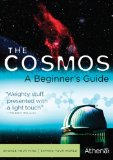| Reviews & Columns |
|
Reviews DVD TV on DVD Blu-ray 4K UHD International DVDs In Theaters Reviews by Studio Video Games Features Collector Series DVDs Easter Egg Database Interviews DVD Talk Radio Feature Articles Columns Anime Talk DVD Savant Horror DVDs The M.O.D. Squad Art House HD Talk Silent DVD
|
DVD Talk Forum |
|
|
| Resources |
|
DVD Price Search Customer Service #'s RCE Info Links |
|
Columns
|
|
|
Cosmos: A Beginner's Guide, The
The British science series "The Cosmos: A Beginners Guide" is wholly truthful, offering viewers a very introductory look at the world beyond us, in six, roughly 28 minute episodes. Hosted by Dr. Adam Hart-Davis, who is assisted by Janet Sumner and Maggie Aderin, the series offers a unique perspective on a ubiquitos subject. Rather than taking the traditional approach of going from point A to now, covering all the heavy hitters of astronomy, Hart-Davis chooses to theme episodes around subjects ranging the search for intelligent life, to the quest for inhabiting the stars and beyond.
Each episode tackles three to four relevant, modern advances in science and through looking at cutting-edge experiments, Hart-Davis and co-presenters are able to weave in historical moments and discoveries that helped scientists get to where they are, as well as provide necessary background information for some complex subjects. The approach is incredibly inviting and not one of the hosts talks down to the viewers. Instead a very inviting, non-jargony method of conversation is employed, making "The Cosmos" a perfect introductory series as advertised, as well as having something to offer a science buff wanting to expand his or her knowledge in the field. Viewers wont walk away from the series being experts by any stretch of the imagination, but they will walk away knowing a little more about the space above their heads and just what science is doing for humanity.
There are a few moments, especially early on in the series where those relatively familiar with big topics like CERN and The Large Hadron Collider, will find their interest possibly waining as the group and purpose is gone over for the uninitiated, but these moments are few and far between. Even if you find yourself fluent in technical jargon, "The Cosmos" should break things down in simple terms for you yourself to explain it to a friend and help spark their interest. I can personally attest, coming from an educational background, that explaining complex subjects I understand in common language to those with no background can be a daunting task. To this I tip my hat to Hart-Davis and team.
One of my favorite examples comes from the fifth episode in the series covering the turbulent universe and the threat to our planet by asteroids. The European Space Agency's Don Quijote mission is covered, explaining to viewers the latest in contingency plans should a life-threatening asteroid find itself heading our way. Instead of just animating the possible approaches to stopping or deflecting an asteroid through CGI (which the series does employ and quite well as a tool, not a focus), they head to an ice rink and examine three methods using a curling stone. While we here in America might not be as familiar with curling, there is no denying how much easier it is to wrap your head around the three asteroid defense methods with a more relatable example.
While such a moment is a nice standout, "The Cosmos" really focuses on getting the men and women working in the relevant fields of study profiled on camera to discuss their work directly and the hosts ensure solid questions are asked of these great minds. "The Cosmos" is far from an exhaustive introduction to the universe and in fact, doesn't cover a lot of the basics people might expect. However, for an introductory look at modern astronomy with a good smattering of historical context, this series is hard to beat.
THE DVD
The Video
The 1.78:1 anamorphic widescreen transfer is largely artifact free, with well above-average detail and natural color levels. Archive footage looks quite slick and the CGI animations that supplement narration are quite striking, only giving a hint of background compression.
The Audio
The English Dolby Digital 2.0 audio track is a very solid stereo offering. Narration and dialogue is crisp, distortion free and properly mixed with effects and a very unobtrusive score. English subtitles for the hearing impaired are included.
The Extras
The bonus features are sparse, consisting of a gallery of astronauts on disc one and the standard Athena physical text supplement covering a small number of topics handled by the series.
Final Thoughts
"The Cosmos: A Beginners Guide" is a wonderful first step into modern astronomy for the casual viewer wanting to broaden their minds and even the serious science nerd. Dr. Adam Hart-Davis and crew have accomplished a tremendous job at being engaging and inviting, despite some daunting material. Those looking for more traditional astronomy subjects might better be served elsewhere, but shouldn't rule out supplementing a more standard astronomy series with this title. Highly Recommended.
|
| Popular Reviews |
| Sponsored Links |
|
|
| Sponsored Links |
|
|
| Release List | Reviews | Shop | Newsletter | Forum | DVD Giveaways | Blu-Ray | Advertise |
|
Copyright 2024 DVDTalk.com All Rights Reserved. Legal Info, Privacy Policy, Terms of Use,
Manage Preferences,
Your Privacy Choices | |||||||














